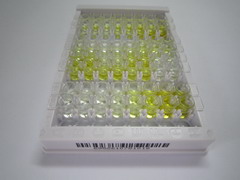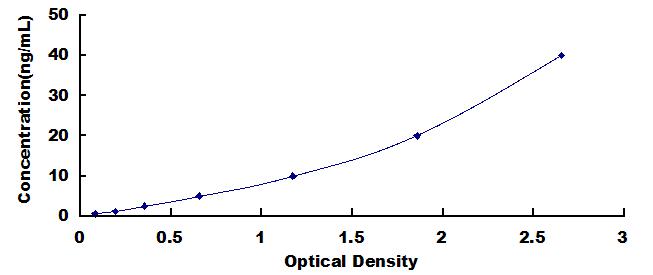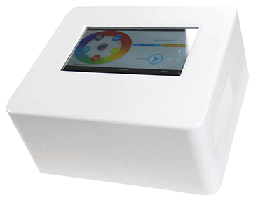Packages (Simulation)

Reagent Preparation

Image (I)
Image (II)
Certificate


ELISA Kit for Aggrecan (AGC)
ACAN; AGC1; AGCAN; CSPG1; CSPCP; CSPGCP; MSK16; SEDK; Cartilage-specific proteoglycan core protein; Large Aggregating Proteoglycan; Chondroitin Sulfate Proteoglycan 1
- Product No.SEB908Rb
- Organism SpeciesOryctolagus cuniculus (Rabbit) Same name, Different species.
- Sample Typeserum, plasma and other biological fluids
- Test MethodDouble-antibody Sandwich
- Assay Length3h
- Detection Range0.625-40ng/mL
- SensitivityThe minimum detectable dose of this kit is typically less than 0.244ng/m.
- DownloadInstruction Manual
- UOM 48T96T 96T*5 96T*10 96T*100
- FOB
US$ 505
US$ 722
US$ 3249
US$ 6137
US$ 50540
For more details, please contact local distributors!
Specificity
This assay has high sensitivity and excellent specificity for detection of Aggrecan (AGC).
No significant cross-reactivity or interference between Aggrecan (AGC) and analogues was observed.
Recovery
Matrices listed below were spiked with certain level of recombinant Aggrecan (AGC) and the recovery rates were calculated by comparing the measured value to the expected amount of Aggrecan (AGC) in samples.
| Matrix | Recovery range (%) | Average(%) |
| serum(n=5) | 93-101 | 97 |
| EDTA plasma(n=5) | 80-101 | 96 |
| heparin plasma(n=5) | 81-95 | 88 |
Precision
Intra-assay Precision (Precision within an assay): 3 samples with low, middle and high level Aggrecan (AGC) were tested 20 times on one plate, respectively.
Inter-assay Precision (Precision between assays): 3 samples with low, middle and high level Aggrecan (AGC) were tested on 3 different plates, 8 replicates in each plate.
CV(%) = SD/meanX100
Intra-Assay: CV<10%
Inter-Assay: CV<12%
Linearity
The linearity of the kit was assayed by testing samples spiked with appropriate concentration of Aggrecan (AGC) and their serial dilutions. The results were demonstrated by the percentage of calculated concentration to the expected.
| Sample | 1:2 | 1:4 | 1:8 | 1:16 |
| serum(n=5) | 98-105% | 80-92% | 96-105% | 97-104% |
| EDTA plasma(n=5) | 80-101% | 85-103% | 91-103% | 86-101% |
| heparin plasma(n=5) | 84-104% | 82-89% | 78-104% | 98-105% |
Stability
The stability of kit is determined by the loss rate of activity. The loss rate of this kit is less than 5% within the expiration date under appropriate storage condition.
To minimize extra influence on the performance, operation procedures and lab conditions, especially room temperature, air humidity, incubator temperature should be strictly controlled. It is also strongly suggested that the whole assay is performed by the same operator from the beginning to the end.
Reagents and materials provided
| Reagents | Quantity | Reagents | Quantity |
| Pre-coated, ready to use 96-well strip plate | 1 | Plate sealer for 96 wells | 4 |
| Standard | 2 | Standard Diluent | 1×20mL |
| Detection Reagent A | 1×120µL | Assay Diluent A | 1×12mL |
| Detection Reagent B | 1×120µL | Assay Diluent B | 1×12mL |
| TMB Substrate | 1×9mL | Stop Solution | 1×6mL |
| Wash Buffer (30 × concentrate) | 1×20mL | Instruction manual | 1 |
Assay procedure summary
1. Prepare all reagents, samples and standards;
2. Add 100µL standard or sample to each well. Incubate 1 hours at 37°C;
3. Aspirate and add 100µL prepared Detection Reagent A. Incubate 1 hour at 37°C;
4. Aspirate and wash 3 times;
5. Add 100µL prepared Detection Reagent B. Incubate 30 minutes at 37°C;
6. Aspirate and wash 5 times;
7. Add 90µL Substrate Solution. Incubate 10-20 minutes at 37°C;
8. Add 50µL Stop Solution. Read at 450nm immediately.
GIVEAWAYS
INCREMENT SERVICES
-
 Single-component Reagents of Assay Kit
Single-component Reagents of Assay Kit
-
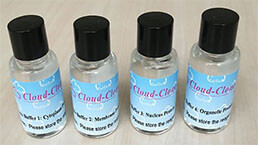 Lysis Buffer Specific for ELISA / CLIA
Lysis Buffer Specific for ELISA / CLIA
-
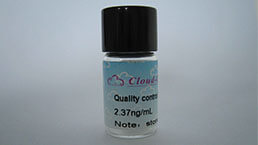 Quality Control of Kit
Quality Control of Kit
-
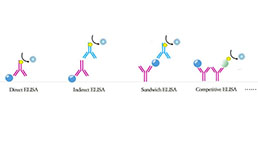 ELISA Kit Customized Service
ELISA Kit Customized Service
-
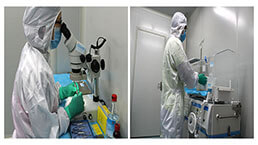 Disease Model Customized Service
Disease Model Customized Service
-
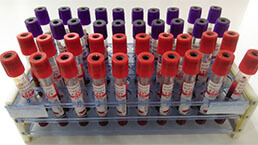 Serums Customized Service
Serums Customized Service
-
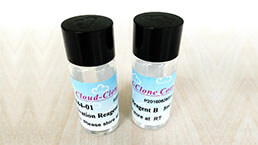 TGFB1 Activation Reagent
TGFB1 Activation Reagent
-
 Real Time PCR Experimental Service
Real Time PCR Experimental Service
-
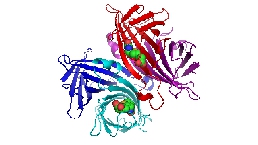 Streptavidin
Streptavidin
-
 Fast blue Protein Stain solution
Fast blue Protein Stain solution -
 Single-component Reagents of FLIA Kit
Single-component Reagents of FLIA Kit
-
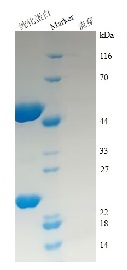 Streptavidin-Agarose Beads
Streptavidin-Agarose Beads
| Magazine | Citations |
| Experimental Biology and Medicine | Acidic pH conditions mimicking degenerative intervertebral discs impair the survival and biological behavior of human adipose-derived mesenchymal stem cells Rsmjournals: Source |
| Age( dordr). | In vitro tenocyte metabolism in aging and oestrogen deficiency Springer: Source |
| PLoS ONE | A Combinatorial Relative Mass Value Evaluation of Endogenous Bioactive Proteins in Three-Dimensional Cultured Nucleus Pulposus Cells of Herniated Intervertebral Discs: Identification of Potential Target Proteins for Gene Therapeutic Approaches Plosone: Source |
| Stem Cell Research & Therapy | Protein synthesis and secretion in human mesenchymal cells derived from bone marrow, adipose tissue and Wharton's jelly. Pubmed: 24739658 |
| Materials Science and Engineering: C | Co-electrospun gelatin-poly(l-lactic acid) scaffolds: Modulation of mechanical properties and chondrocyte response as a function of composition ScienceDirect: S0928493113006656 |
| PLoS One. | Mesenchymal stromal cell proliferation, gene expression and protein production in human platelet-rich plasma-supplemented media Pubmed:Pmc4130592 |
| Connective Tissue Research | Metabolic and cytoprotective effects of in vivo peri-patellar hyaluronic acid injections in cultured tenocytes Pubmed:25333747 |
| Macromolecular Bioscience | Highly Porous Gelatin Reinforced 4D Scaffolds for Articular Cartilage Regeneration PubMed: 25787871 |
| Osteoarthritis and Cartilage | Parathyroid hormone(1-34) exhibits more comprehensive effects than celecoxib in cartilage metabolism and maintaining subchondral bone micro-architecture in meniscectomized Cavia (Guinea pig )inea pigs Pubmed:26802547 |
| Cell Proliferation | Effects of low oxygen tension on gene profile of soluble growth factors in co‐cultured adipose‐derived stromal cells and chondrocytes Pubmed:27090063 |
| bmc musculoskeletal disorders | Strontium ranelate causes osteophytes overgrowth in a model of early phase osteoarthritis. pubmed:28187731 |
| Journal of Clinical Medicine | Aggrecan Turnover in Women with Rheumatoid Arthritis Treated with TNF-α Inhibitors Pubmed: 32392807 |
| Loss of autophagy in tibial plateau chondrocytes causes increased apoptosis of chondrocytes in spontaneous osteoarthritis of guinea pigs | |
| researchsquare | Aggrecan-a new biomarker for acute type A aortic dissection 33990642 |
| Catalog No. | Related products for research use of Oryctolagus cuniculus (Rabbit) Organism species | Applications (RESEARCH USE ONLY!) |
| RPB908Rb01 | Recombinant Aggrecan (AGC) | Positive Control; Immunogen; SDS-PAGE; WB. |
| PAB908Rb51 | Polyclonal Antibody to Aggrecan (AGC) | WB; IHC; ICC; IP. |
| MAB908Rb21 | Monoclonal Antibody to Aggrecan (AGC) | WB; IHC; ICC; IP. |
| SEB908Rb | ELISA Kit for Aggrecan (AGC) | Enzyme-linked immunosorbent assay for Antigen Detection. |
| LMB908Rb | Multiplex Assay Kit for Aggrecan (AGC) ,etc. by FLIA (Flow Luminescence Immunoassay) | FLIA Kit for Antigen Detection. |

